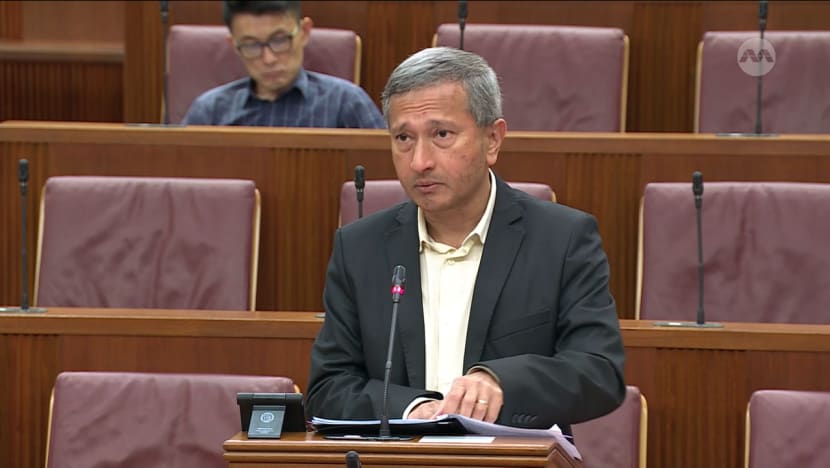Singapore prepared to recognise a Palestinian state with an effective govt that accepts Israel's right to exist
Minister for Foreign Affairs Vivian Balakrishnan also said Singapore will continue to use the S$10 million Enhanced Technical Assistance Package to help the Palestinian Authority prepare for eventual statehood.

Singapore Minister for Foreign Affairs Vivian Balakrishnan urged Israel and Palestine to take steps toward long-lasting peace and put an end to the suffering "that has gone on for far too long".

This audio is generated by an AI tool.
SINGAPORE: Singapore is "prepared in principle" to recognise Palestine as a sovereign state if it has an effective government that renounces terrorism and accepts Israel's right to exist, Minister for Foreign Affairs Vivian Balakrishnan said in parliament on Tuesday (Jul 2).
He was addressing five questions raised by Members of Parliament about Palestine and Singapore's aid in reconstruction.
Dr Balakrishnan noted that, in May this year, Singapore voted in favour of the resolution expressing support for Palestine's membership in the United Nations after "very careful consideration".
"This reflected our hope to encourage both Israel and Palestine to resume direct negotiations towards a two-state solution, at a time when in fact the prospects for such negotiations were increasingly bleak," he said.
The decision was also in line with Singapore's consistent support for the principles of international law, he added.
"Our vote at the United Nations General Assembly means that Singapore is prepared in principle to recognise the State of Palestine," said Dr Balakrishnan. "We will make this move at an appropriate time."
"Our key consideration is that such a move on our part should help progress toward peace and a negotiated two-state solution."
The two-state solution is the "only viable path" for achieving a comprehensive, just and durable solution to the conflict, which Singapore has consistently advocated for, he said.
"In particular, there will need to be an effective Palestinian government that accepts Israel’s right to exist and categorically rejects terrorism."
"Both sides have legitimate rights, and both peoples have a right to live in peace and dignity within secure borders," he said.
In response to a supplementary question by MP Gerald Giam (WP-Aljunied) on what thresholds would need to be crossed for Singapore to recognise the state of Palestine, Dr Balakrishnan said the principle consideration is whether, when Singapore takes that step, it helps or hinders the progress towards peace.
That, in turn, depends on negotiations between both sides, he said.
Every country has to decide whether there is an effective Palestinian leadership that represents all Palestinians, has effective control over the West Bank and the Gaza Strip, and has the mandate to negotiate with the Israelis, he added.
Different countries will have different thresholds and will arrive at an answer in their own time. It also depends on their domestic circumstances, he said.
"I would say that we are not going to lock ourselves in to a specific time or to whether or not other countries have made decisions in parallel, on the same fundamental question," said Dr Balakrishnan.
Mr Giam then asked if Singapore might then be in a catch-22 situation where it does not recognise the state of Palestine because there is no effective government governing the territory, but current realities prevent an effective government from emerging.
Dr Balakrishnan said there are two different dimensions - whether there is an effective Palestinian leadership is a separate question from whether there is a recognisable Palestinian state.
He reiterated Singapore's position that only a negotiated two-state solution will lead to enduring peace.
"Without those prerequisites, never mind the diplomatic and legal niceties. Without the recognition and respect of the other's right to exist and without renouncing terrorism, these cycles of violence will recur."
He also said Singapore has an unusual and unique privilege of being welcomed by all sides, including "warring parties", because of our track record of principled, deliberate, careful diplomacy.
The conflict is difficult and complex, and is a "family quarrel in another family", he added.
Singapore is prepared in principle to recognise a Palestinian state “at an appropriate time”. The key consideration is that such a move should help progress towards peace and a negotiated two-state solution. In particular, there will need to be an effective Palestinian government that accepts Israel’s right to exist and categorically rejects terrorism. Foreign Affairs Minister Vivian Balakrishnan said this in Parliament on Tuesday (Jul 2) in reply to MPs’ questions. He noted that in May this year, after “very careful consideration”, Singapore voted in favour of a resolution expressing support for Palestine’s membership in the United Nations. This reflected its hope of encouraging Israel and Palestine to resume direct negotiations towards a two-state solution at a time when prospects were increasingly bleak. It was also in line with Singapore’s consistent support for the principles of international law. Dr Balakrishnan urged Israel and Palestine to take steps towards a long-lasting peace and end the suffering “that has gone on for far too long”. As a friend to both sides, Singapore will continue to offer encouragement and tangible support, he said. Singapore will continue to implement its S$10 million Enhanced Technical Assistance Package to help the Palestinian Authority build capacity and prepare for eventual statehood. More than 750 officials have been trained so far in areas like diplomacy, water management, economic management and urban planning. A course on transforming the public service through artificial intelligence will be organised for Palestinian officials this month. They can also receive fully funded scholarships to pursue postgraduate studies in Singapore universities. To a question on training Palestinian officials to aid the reconstruction of Gaza, Dr Balakrishnan said Singapore will assess how best to help bilaterally and as part of multilateral efforts.
Singapore does not engage in performative gestures, said Dr Balakrishnan.
"My focus is not to add fuel to the fire, but to be quietly, discreetly, constructively helpful to the people at the humanitarian level and to build up capacity, specifically with respect to the Palestinian Authority."
He urged Israel and Palestine to take steps toward long-lasting peace and put an end to the suffering "that has gone on for far too long".
The Israelis and Palestinians need to exercise leadership and work together for a better future, he said.
"As Singapore is a friend to both, Singapore will continue to offer our encouragement and our tangible support."
STUDY VISITS, SCHOLARSHIPS
To that end, Singapore will continue to tap the S$10 million (US$7.4 million) Enhanced Technical Assistance Package to help the Palestinian Authority build capacity and prepare for eventual statehood, said Dr Balakrishnan.
Palestinian officials will be in Singapore from Jul 8 to Jul 12 for a study visit on using artificial intelligence in the public service.
Singapore has hosted Palestinians delegations for 18 study visits over the years on topics including urban planning and development, and public finance and fiscal policy.
More than 750 officials have also been trained in areas like diplomacy, water management and economic development, said Dr Balakrishnan.
Postgraduate scholarships have also been disbursed to 13 Palestinian officials to study at the Nanyang Technological University and the National University of Singapore.
Science, Technology, Engineering and Mathematics courses were included in the programmes offered under the assistance package in response to feedback that Palestinian officials were interested in them as they can better support development.
The Enhanced Technical Assistance Package was first presented in 2013, and the amount was doubled to S$10 million in 2016.
"We hope that these training opportunities will help Palestinian Authority officials better serve the Palestinian people, as well as equip them with the necessary skills when it comes to the eventual reconstruction of Gaza," said Dr Balakrishnan.
With regard to a question on training Palestinian officials to aid the reconstruction of Gaza, the minister said Singapore will assess how best to assist bilaterally.
"We stand ready to contribute, taking into account Gaza’s needs and an account of our own resources and expertise, but clearly all this can only take effect when the fighting ceases," he said. "For now, the focus has to be on securing an immediate humanitarian ceasefire in Gaza and the release of all hostages immediately."
Non-Constituency Member of Parliament Leong Mun Wai also asked the minister whether Singapore has sold any materials that could cause harm to civilians to Israel since Oct 7.
Dr Balakrishnan said Singapore complies strictly with international obligations on international arms sales as well as UN sanctions and embargoes against any country. Singapore also submits regular reports to the UN Register of Conventional Arms.
"Apart from this, it is the established policy of the government not to publicly divulge any details of defence sales for national security reasons," he said.
















